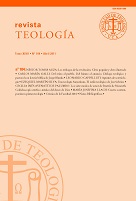Del Reino al Pueblo. Del himno al anuncio
Palabras clave:
Reino de Dios, Pueblo de Dios, pueblos, Deutero-Isaías, Salmos, postexilio, lenguaje, profecía, himno, anuncio, eclesiología, liturgia, América Latina, AparecidaResumen
Este trabajo aborda tres temas de permanente actualidad: los lenguajes de la teología, los vínculos entre el Reino de Dios, la Iglesia y los pueblos, y la comunicación del Evangelio. Analiza las cuestiones en un diálogo teológico y pastoral con la reciente tesis doctoral del biblista argentino Jorge Blunda, cuya obra estudia la proclamación de reinado de Dios y su función performativa para constituir al Israel postexílico en el Deutero-Isaías y los salmos 96 y 98. Para eso traza un perfil del autor y resume el núcleo de su aporte. En relación con la forma de los textos señala la actualidad del anuncio profético y el himno litúrgico en el lenguaje teológico. En relación con el fondo indica la teología de la presencia de Yhwh rey y su reino en el Pueblo de Dios como signo de salvación para los pueblos. Hace una relectura de esa estrategia de comunicar la Buena Nueva para recrear la comunidad de fe y colaborar en renovar la vida de nuestros pueblos en los bicentenarios. El artículo se ubica en la historia de la teología argentina y en el diálogo entre los biblistas y los teólogos sistemáticos.Descargas
Los datos de descargas todavía no están disponibles.
Descargas
Publicado
25-03-2020
Cómo citar
Galli, C. M. (2020). Del Reino al Pueblo. Del himno al anuncio. Teología, 48(104), 33–66. Recuperado a partir de https://erevistas.uca.edu.ar./index.php/TEO/article/view/2253
Número
Sección
Artículos
Licencia
Derechos de autor 2020 Teología

Esta obra está bajo una licencia internacional Creative Commons Atribución-NoComercial-CompartirIgual 4.0.














 Teología
Teología